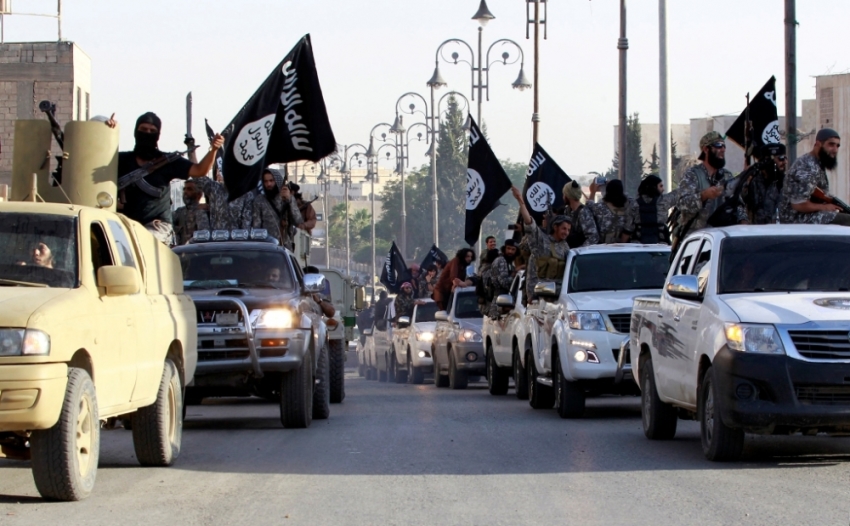Ex Female ISIS Member: I Saw Teen Boy Crucified, Man Beheaded and Knew I Had to Escape

With a growing number of women across the globe being convinced by online love interests to join the Islamic State's terror spree in Iraq and Syria, a former Syrian elementary school teacher and now ex-Islamic State patrol guard said that females are "duped" into joining the Islamic State, and shared the details of her journey that led her to join and, ultimately, defect from the militant group, in hopes it discourages other women from joining the jihad.
Hoping to expose the underlying truths about the Islamic State and their recruitment of women with a rare insider's perspecitve into the inner workings of the Islamic State foot patrol, a 25-year-old former ISIS patrol officer explained in a CNN interview how she was fooled into joining the Islamic State and why she deserted the group by fleeing into Turkey right before the start of the U.S.-coalition airstrikes in September.
"I don't want anyone else to be duped by [ISIS]," the women speaking under the alias of "khadija" said. "Too many girls think they are the right Islam."
Originally searching for protection and an escape from the violence caused from the Syrian rebel uprising against the regiem of Bashar al-Assad, Khadija said she had become influenced by a Tunisian man that she had met through online dating. The man kept trying to convince her that joining the Islamic State was the right thing to do and that they should meet in Raqqa.
Khadija said he was adamant in saying that the group was not a terrorist organization and they were not as bad as the media made them out out be. She said that he also encouraged her by saying that the goal of the Islamic State was simply to "properly implement Islam" and the organization's actions will be less violent once the "war" has ended.
"He would say, 'We are going to properly implement Islam,'" Khadija said. "Right now we are in a state of war, a phase where we need to control the country, so we have to be harsh.'"
Putting full trust in her online relationship, Khadija convinced her family that moving to Raqqa was the best thing to do in the interest of her younger siblings that needed to register for school.
Khadija's cousin also lived in Raqqa and subsequently was working for ISIS' Khansa'a brigade, which is made up of about 30 women responsible for patrolling the streets of Raqqa and punishing any woman that is not wearing the correct Sharia clothing. Punishment for such offense is usually a lashing.
Once she moved to Raqqa, Khadija said that her cousin took her to the brigade headquarters and introduced her to the Brigade leader, Umm Rayan. Khadija would later join the brigade and would be trained how to fire a gun.
Although Khadija said she initially experienced happiness in having sense of authority granted by her role in the brigade, it had turned her into someone she became "afraid" of.
"We'd patrol the streets. If we saw a woman not wearing the proper Sharia clothing, we'd grab her, sometimes they'd get lashed," Khadija said. "At the start, I was happy. I was carrying a gun. It was something new. I had authority. I didn't think I was frightening people. But then I started asking myself, 'where am I? Where am I going? I could feel the tides dragging me some place ugly."
She began to have real doubts when she saw the brutal nature in which some of the foreign fighters treated women and their own wives. She recalled instances when women were beaten so badly they had to be taken to the emergency room. She also said that inside the brigade's headquarters their was an office that conducted arraigned marraiges, and in some cases, forced marraiges.
Khadija said she truly started to rethink her decision to join the militants when she started noticing the atrocious nature of their killings.
Khadija said her first eye-popping moment came when she saw a picture of a teenage boy that was crucified by ISIS militants after being accused of rape. Khadija added that the final straw came when she witnessed a man being beheaded right in front of her.
Shortly after the beheading incident, Khadija said Rayan began pressuring her to accept an arranged marriage and that point she knew she wanted to leave.
"So it was at this point, I said enough," Khadija said. "After all that I had already seen and all the times I stayed silent, telling myself, 'We're at war, then it will all be rectified.' But after this, I decided no, 'I have to leave.'"
Now in Turkey, Khadija is trying to get her old life back in order but fears ISIS may have her marked for death for her desertion. The rest of her family has also fled Raqqa but is still in Syria. Khadija said she just wants her life back the way it was.
"A girl who is merry, who loves life and laughter... who loves to travel, to draw, to walk in the street with her headphones listening to music without caring what anyone thinks," she said. "I want to be like that again."



























